The parenting lessons to be taken from movies
- Published
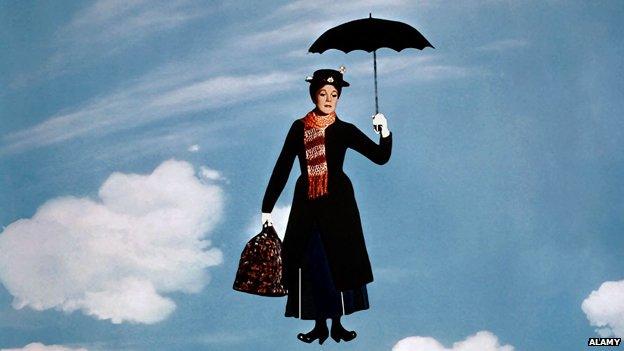
It is 50 years since Mary Poppins appeared on cinema screens. The film presented a very particular view of middle-class family life, but have movies influenced how people think about parenting?
Mary Poppins taught parents many things. Bedrooms are better tidied, every chore has its fun side and an organised day is a happy day. Poppins's strict-but-saccharine manner brought the unruly Jane and Michael Banks under control - she succeeded where their parents and numerous lesser nannies could not.
Though decades old, Poppins's techniques are still lauded by parents.
Childcare blogger Kenney Myers describes her as "the gold standard", while parenting expert Michael Grose says there are some key parenting lessons to learn from Poppins.
The relationship between parents and children, or nannies and children, is one often explored in films. It can result in a strange osmosis for viewers.
"The things we can learn from Mary Poppins is how important boundaries are, and the role that they play in raising children," says Bernie Wooder, a psychoanalyst who uses "film therapy" as part of his treatment technique.
"When she comes along she brings organisation and it appears to look like magic because everything starts to go right. It's an effective lesson."
Wooder adds that he prescribed the viewing of the Robin Williams film Mrs Doubtfire for one father.
The film sees Williams play Daniel Hillard, a dad who loses custody of his children following a divorce. In his desperation to see them, he ends up dressing up as a woman, complete with a false nose and twin sets, and putting on a Scottish accent to win the job as their nanny.
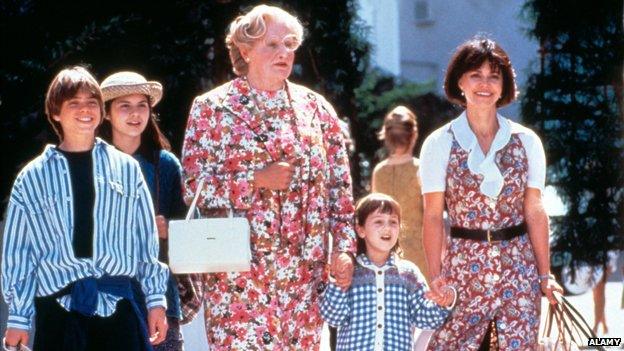
One dose of Mrs Doubtfire, twice daily...
"That film really helped one of my clients because it expressed the level of frustration that he was feeling - that he was prepared to do anything at all to spend time with his kids," adds Wooder. Using a disguise to bypass custody arrangements is obviously inadvisable in the real world but the film offers a lesson about closeness.
"Films are a remarkable tool for helping people learn, it's about recognising a feeling or an atmosphere and taking some time to just sit, watch and consider it."
Williams's soft-spoken nanny is one of a number of film characters that explore the relationship between fathers and their children. Three Men and a Baby and Kramer vs Kramer may be very different in tone, but both look at the intimacy of the father-child relationship.
Then there is drill sergeant father figure of Captain von Trapp in The Sound Of Music, whose children march in line to the sound of his whistle. The gradual softening of his approach results in a much closer relationship.
For parenting expert Sarah Ockwell-Smith, it is Disney's Finding Nemo that presents the best lessons. "It's a great example of a single parent family, or more specifically a single father raising his son alone from birth - something you see rarely in films," she says.
"At the beginning Nemo's father is what we call a 'helicopter parent' - always fussing over the child and never letting him have any freedom. I think the film shows this style of parenting is not great and still not a guarantee of accidents not happening.
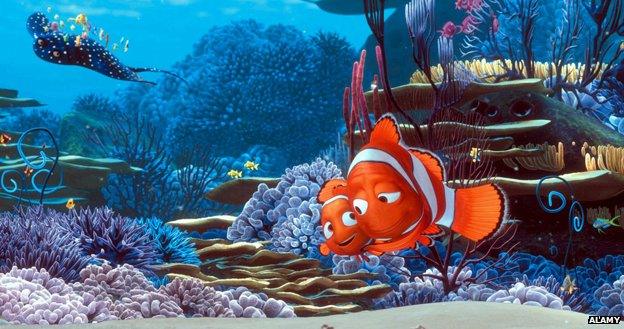
Confidence-boosting... or smothering?
"The film [goes on to] show how confident Nemo is, which is a reflection of great parenting."
The 2010 movie The Kids Are All Right presents a different view of the modern family. Annette Bening and Julianne Moore play a lesbian couple who have two children conceived using a sperm donor. Their daughter tracks down the donor and he gradually becomes part of the household.
In the film Cyrus it is the overly close relationship between a mother and son that is explored, and the tensions that arise when the mother, played by Marisa Tomei, begins a new relationship.
"Films teach what to do and what not to do in equal measure," says parenting expert Dr Claire Halsey. "That still provides a valuable lesson and a point for reflection.
"What is great is when films show different variations on the family group. Family can be in all shapes and sizes and that's a great lesson for parents and children."

There's something about nanny movies
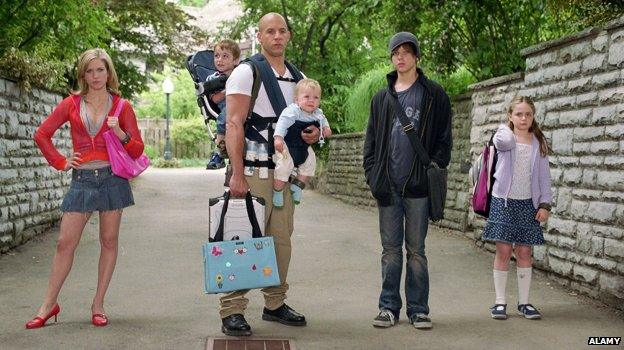
Mrs Doubtfire, The Sound of Music and Mary Poppins aren't the only films to draw on the transformative role a nanny can play in children's lives:
Mr Nanny (1993) - Hulk Hogan acts as bodyguard-cum-nanny to two mischievous brats who have no discipline due to their often distracted and absent widower father. Includes villains seeking a microchip.
The Pacifier (2005) - Continuing the theme of hard man-cum-nanny, Vin Diesel (pictured) looks after five antagonistic kids whose father has died. Gruff exteriors transformed on both sides. Includes villains seeking microchip-like technology.
Nanny McPhee (2005) - Emma Thompson's Nanny McPhee swoops in to help a widower handle his seven unruly children. With magic and discipline she transforms their lives, changing herself in the process.
Jack and Sarah (1995) - Richard E Grant's Jack is a widower, after his partner dies in childbirth. Grief-stricken, he goes off the rails, until he eventually faces his parental duties with help from nanny Amy.
The Nanny Diaries (2007) - Shock. No widow or widower. Scarlett Johansson is a nanny for a rich family in which the son is neglected. Despite getting fired, she transforms the lives of the child and wife.

Very large families are a popular feature in films. Often chaotic, they are a vehicle for showing stressed, less-than-perfect parents. In Home Alone, Macaulay Culkin's character Kevin was famously forgotten by his family - left behind when they went on their Christmas holiday.
Cheaper By The Dozen sees parents battle with constant untidiness caused by their many children. "Lots of movies show the extreme, it's either the perfect family or the completely dysfunctional ones," says Helen O'Hara, deputy online editor of Empire magazine.
"In Cheaper By The Dozen they actually have a pretty perfect life, they have to deal with some messiness but their family is solid, the marriage is solid and they live in a gorgeous house.
"The film Parenthood in the '90s showed something a bit more. There were more varieties of parenting on display in that film, and they are dealing with interesting issues."

The Magazine on parenting
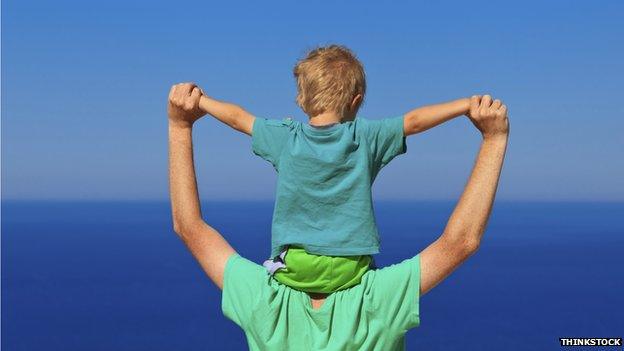

Parenthood followed the varying dilemmas faced by an extended family. There is the single mother dealing with her difficult teenage children, a father desperately trying to push his daughter into being a child genius, and the exuberant dad, played by Steve Martin, who lives chaotically with his growing family, making balloon animals and always taking things too far.
O'Hara adds: "There's a moment where Steve Martin's character is dealing with his son who is in a fast food restaurant and he took his retainer brace out to eat his burger and ended up losing it. He ends up having to search through the bins.
"It's ridiculous really, but there's a certain sangfroid in knowing the you aren't going to be any of those parents in the film - you're not going to make those mistakes."
Subscribe to the BBC News Magazine's email newsletter to get articles sent to your inbox.